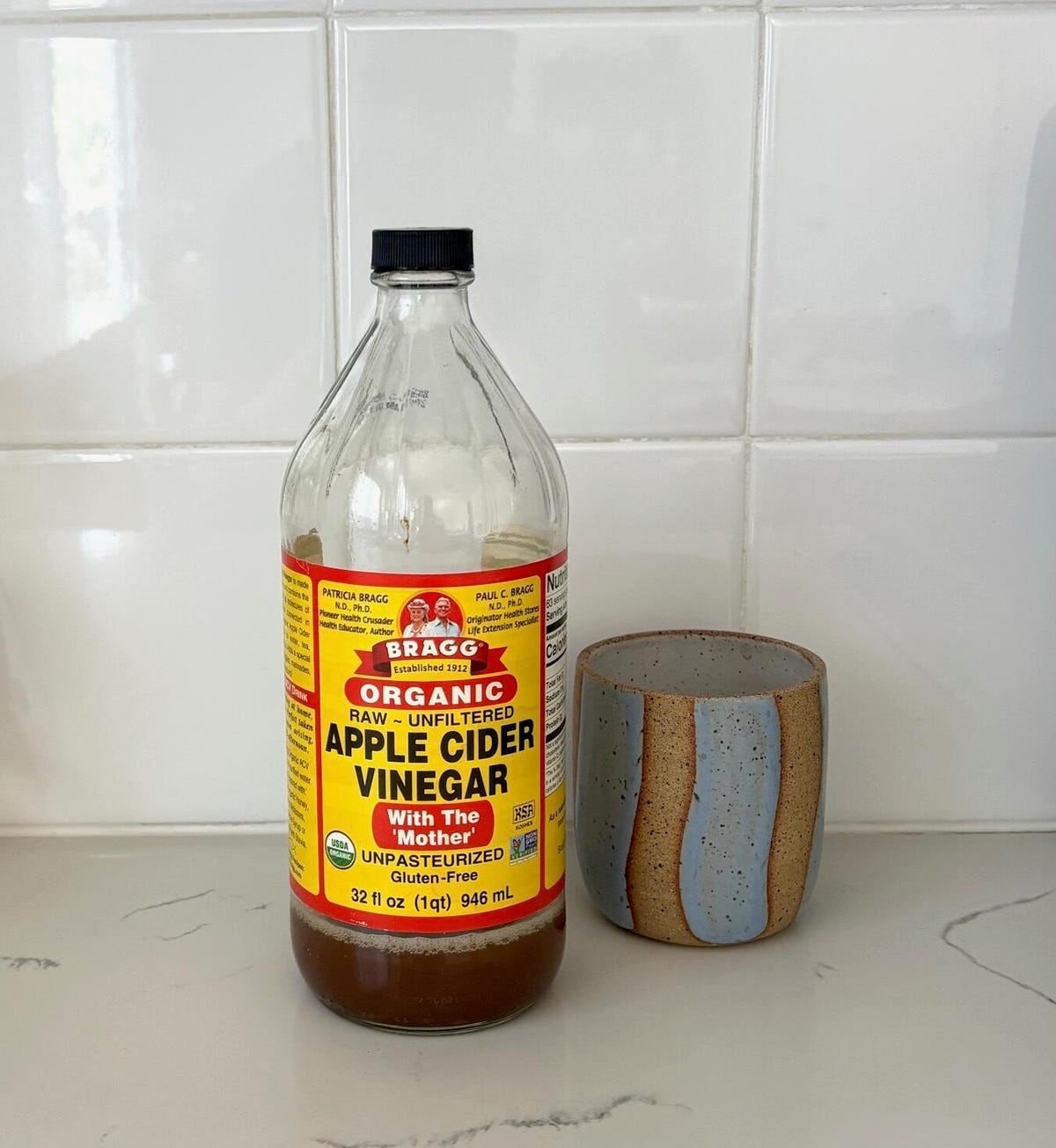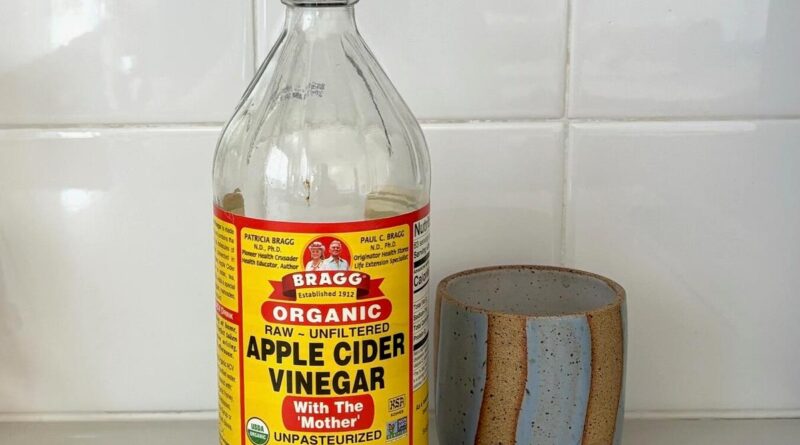Here’s how to use the power of cider vinegar for your health
TikTok has cider vinegar health hacks right now. If you’re on that side of the Internet, it’s hard to navigate without seeing something about this kitchen staple. That made us wonder if all the hype surrounding it is true or just a bunch of exaggerated claims. Can you use apple cider vinegar to cook, clean and improve your health?
Vinegar has a long history, dating back to at least 5,000 BC Its many uses include preservation, flavoring, pickling and medicine. Apple cider vinegar, in particular, contains antibacterial and antioxidant properties, and there is research to support at least some of the claims circulating about its health benefits.
Yes, there are health benefits to cider vinegar if you take the right amount. Do not ignore the possible side effects before using them for your health. Here is everything you need to know about the health benefits, side effects and best cider vinegar dosages to follow.
For more kitchen-to-health news, here’s how your cookware is safe to use and 11 foods that don’t have to be staples in your diet.
What is apple cider vinegar or ACV?
When you combine apples, sugar and yeast and let them ferment, they make cider vinegar. Over several weeks, the yeast will digest the sugar to make alcohol. Once this happens, the natural bacteria will convert the alcohol into acetic acid, which is where the aroma and taste of apple cider vinegar come from.
You have two options when buying cider vinegar: filtered and pasteurized, or raw and unpasteurized. The cloudy sludge that collects at the bottom of the bottle is the “mother,” a mixture of bacteria and yeast. Some speculate that the mother is the one that provides the health benefits, as it contains healthy bacteria and probiotics.
Apple cider vinegar can be used in the kitchen, around the house and for your health as:
- The smell is good
- Barrel
- Dressing or vinaigrette
- The cleaner
- Facial toner
- Marinade
- Washing fruits and vegetables
- A dental hygienist
- Washing hair
- Treatment of dandruff
- A weed killer
- Wash your mouth

4 benefits of apple cider vinegar you should know
Although more research is needed, several small and medium-sized studies show the benefits of cider vinegar for other health issues and as a weight loss aid.
1. It can help control blood sugar and diabetes
Up to 95% of people with diabetes have type 2 diabetes, according to the Centers for Disease Control and Prevention. Type 2 diabetes occurs as a result of insulin resistance, which is “when the body’s cells do not respond well to insulin, which leads to an increase in glucose or sugar in the blood,” according to Amelia Ti, an expert on diet and diabetes officially registered. NYC.
Even if you don’t have diabetes, it’s good to keep your blood sugar levels in the normal range. Studies have shown that cider vinegar can improve insulin response and lower blood sugar after a meal.
Drinking cider vinegar before bed has also been shown to reduce blood sugar after waking up. Be sure to check with your doctor before consuming ACV if you have diabetes, especially if you are taking medication due to potential side effects.
“ACV alone will not lower blood sugar and should not be considered a substitute for diabetes medication,” says Ti.
Read more: Atlantic Foods: Why Eating Whole Foods, Local Food Can Improve Your Life
2. Kills harmful bacteria

Those who want to preserve food naturally may want to consider using cider vinegar. It is a known pathogen killer, including bacteria such as staph and candida.
Vinegar is a popular preservative in Korea as it can prevent E. coli and norovirus from growing in food. E. coli can cause food poisoning when eaten, but the bactericidal effects of acetic acid in apple cider vinegar can prevent that from happening.
Read more: 12 Best Probiotic Foods to Eat for Gut Health
3. It can lead to weight loss
Another benefit of cider vinegar that can be beneficial is its ability to help weight loss. When taken before or during meals, ACV has been shown to help with satiety (feelings of fullness).
In one study, participants ate about 200 to 275 calories when apple cider vinegar was mixed with food. Over three months, participants taking one to two tablespoons of ACV per day saw up to 3.7 pounds in weight loss and a reduction in body fat.
4. It can improve cholesterol levels
High cholesterol and triglyceride levels can increase the risk of heart disease.
Adding up to an ounce of cider vinegar to your day, along with a low-calorie diet, can lower total cholesterol and triglycerides while increasing “good” HDL cholesterol.
Those with type 2 diabetes may also see positive effects on their total cholesterol and triglyceride levels when they add half of ACV to their diet.
Read more: 7 Money Saving Tips for Healthy Eating on a Budget
Possible side effects of cider vinegar that you should be aware of
Although there are benefits to the use of cider vinegar, there are also side effects that can be considered. High acidity can remove tooth enamel, which will not come back once it is gone. It can cause damage to the esophagus or stomach if you drink it raw.
Here are some possible side effects of cider vinegar:
- May cause hypokalemia (low potassium levels)
- It can interact with diuretics, insulin and other medications
- It can cause nausea or vomiting
- It can weaken tooth enamel
- It can cause burning of the throat (throat) or ulcers if used in excess
Diluting it with water or juice not only makes ACV palatable, but can also reduce the risk of damaging your throat and teeth. Mixing a tablespoon or two of each can also heal an upset stomach.
Marisa Moore, MBA, RDN, LD, a registered dietitian nutritionist, also advises, “It’s important to remember that no diet has a silver bullet. If you choose to include apple cider vinegar, do such as safely and by focusing on maintaining a balanced diet for your overall health and well-being.”
How much apple cider vinegar should you drink a day?
The amount of cider vinegar depends on what you are using it for. In general, Ti says, “I recommend 1 teaspoon to a tablespoon of ACV diluted in 6-8 oz of warm water before meals.”
If you want to drink it, dilute it with water or your favorite juice or tea. You can also eat it by adding it to your favorite foods, especially vegetables, vinaigrette and even when you make your own mayonnaise.
There are also many pre-made cider vinegar drinks out there, which can make ACV taste better. You can find these drinks from brands like Bragg, Poppi, Remedy and Sidekick Sodas. Local grocery stores and even grocery stores may carry these, so be aware if you’re interested in cider vinegar drinks.
You can also add a cup or two to the bath for skin issues. Mixing a tablespoon of ACV in a cup of water, then soaking gauze or cotton in the solution can make a wet compress.
To use cider vinegar as a hair rinse, mix up to two tablespoons per cup of water, then apply to hair after shampooing. Wait five minutes, then rinse. It can be drying, so use sparingly. ACV can also irritate the scalp, so a little less is better.

Low profile
Although some studies have found the benefits of cider vinegar, we need more research to prove exactly how good ACV is. It can help with weight loss, control type 2 diabetes, blood sugar and cholesterol and can inhibit the growth of harmful bacteria in food. Drinking undiluted cider vinegar can cause tooth erosion or damage to the esophagus. Mixing ACV with water or juice before eating can prevent tooth and throat damage. As with any natural remedy, talk to your doctor before trying cider vinegar and do a skin test before using it on your skin.
“Remember that the benefits of living a healthy life in general (eg, a nutritious and balanced diet, adequate water, regular exercise/movement, good sleep, stress management, etc.) -so) is bigger than food, drink, or supplement,” concludes Ti. “There is no quick fix and ACV is definitely not a miracle solution!”
#Heres #power #cider #vinegar #health
